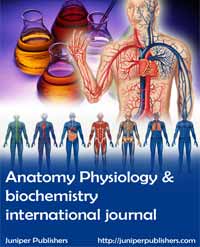The Relationship between Nutrition and Carcinogenic Pathology
Anatomy Physiology & Biochemistry International Journal Juniper Publishers
Abstract
There are obvious differences in the incidence of specific cancers for different geographic areas of the world. The role of the breed in the development of specific types of cancer is difficult to say because in most cases this factorial load is represented by eating habits or practices. Frequency of carcinogenic pathology is higher in developed countries, as modern civilization, industrialization, chemistry, refined processed foods lead to the formation of malignant tumors. Statistics show the most common form of cancer being the one there colorectal or intestinal, this being the 8th part of the total cancers. A balanced diet can stop or even treat this bad pathology.
Keywords: Colon; Cancer; Nutrition; Human race; Geographical areas, Mediterranean, Asian diet
Introduction
The most powerful factor that affects well or bad health is diet [1]. Numerous epidemiological studies have confirmed that there is a close link between eating habits and the risk of developing Cancer [2]. 30% of all carcinogenic pathology is determined by a diet that is not correct [3], 30-40% of the tumors can be avoided with a healthy diet [1]. Lifestyle seems to be involved in triggering all female neoplasms in proportion of 50% and 30% of male ones [4]. One of the factors that contributed to the discovery of this relationship was the incidence of certain types of cancer identified in certain geographic areas. Each country has different eating habits and lifestyles influencing health: Colon cancer is 10 times more common in the United States than in Nigeria; Liver cancer is 100 times more prevalent in Mozambique than England; It has been found that breast cancer has a high incidence among women moving from Oriental countries to European countries. The most common forms of carcinogenic tumors related to unbalanced diet, are especially interested in stomach, pancreas, liver, uterus, prostate, colon and breast.
Cancer in the colon-rectum develops particularly due to excess consumption of red meat and low fiber intake. Stomach cancer develops through abuse of chemicals contained in smoked foods. Prostate cancer is due to excessive dairy consumption and low intake of vegetables. Breast cancer results from high consumption of alcohol, red meat and low fiber intake of plant origin. Liver cancer occurs in excessive intake of alcohol and food contaminated with toxins. Ovarian cancer is related to milk and cheese consumption [5]. Generally, a fat-rich diet of animal origin predisposes to the development of cancer in the breast, pancreas, and prostate [2].
There are scientific records that vary according to the composition of the diet.
a. The Mediterranean diet, adopted in southern Europe, in the Middle East, in North Africa, due to its characteristic composition (rich in wheat, fruit, vegetables, sweet almonds, cheese, fish, wine, bread and pasta) determines a low incidence cardiovascular disease and carcinogenic tumors (in the mouth, pharynx, esophagus, colon-rectum, pancreas).
b. Asian diet adopted in India, Sri Lanka, Thailand, Cambodia, China, Korea, Japan, due to its composition (rich in rice, vegetables, fruit, fish, no milk and cheese consumed) has better scientific evidence, who has this type of diet has a low incidence of obesity, type II diabetes , cardiovascular disease and malignant tumors (oral cavity, pharynx, esophagus, stomach, lung, breast, colon-right).
c. We can observe that scientific evidence shows a very high incidence of cardiovascular disease, obesity, osteoporosis, alzheimer’s, Parkinson’s and malignant tumors in the Western diet in North America, USA, England, South Africa, Australia and New Zealand. this diet contains in its composition: sweets, meat with preservatives, milk, refined foods (processed), cheese, alcohol, fats of animal and vegetable origin. [6] Comparative studies of people living in Africa and those living in Europe have seen marked differences in their colon, bowel habits in general. Africans, due to their high fiber diet, do not suffer from constipation, have diverticula in the terminal portion of the ileum, and rarely suffer from inflammatory bowel disease, irritable bowel syndrome, and malignant tumors [7]. The goal is to adopt a healthy diet to create an unfavorable environment for the development of malignant tumors. Increase in immunity through food consumption such as: Shiitake mushrooms, Maitake mushrooms, Pleurotus Ostreatus mushrooms, green-yellow vegetables (contain antioxidant carotenoids); Decreasing growth and proliferation factors, sugar consumption will increase insulin in circulation, being an anabolic hormone will cause inflammation and cell proliferation; the foods that reduce these stimuli are: cacao (contains polyphenols), rosemary (carnosol), currants (anthocyanins), raspberry (elargic acid).
Decrease of inflammation
The tumor cells develop in an acidic, oxygen-free, and inflamed environment. Acidity is given by the animal’s origin; Inflammation is caused by saturated cholesterol fatty acids; they are found in food of animal origin. Foods of plant origin alkalize and disinfect tissues; cells proliferate in the anaerobic environment, for that is fundamental to doing sports; sport activity facilitates the circulation, cellular oxygenation of all tissues. The foods that cause the decrease of inflammation are brown rice, pomegranate, flaxseed, curcuma, ginger.
Angiogenesis decrease
Tumor mass needs a good network of blood vessels that provide oxygen and eliminates toxic metabolites, if you eat certain foods such as ginger, soy, green tea, cocoa, turmeric will cause a decrease in angiogenesis [6].
Conclusion
Nutritional recommendations to prevent (sometimes cure) cancer suggest a diet rich in vegetables, fruits, cereals, and red meat, sausages and alcohol [1] because chaotic nutrition, maintained for a long time, certainly aggravates a prognosis that has been already announced [8].
To Know More About Anatomy Physiology & Biochemistry International Journal Please click on:
For more Open Access Journals in Juniper Publishers please click on:


Comments
Post a Comment